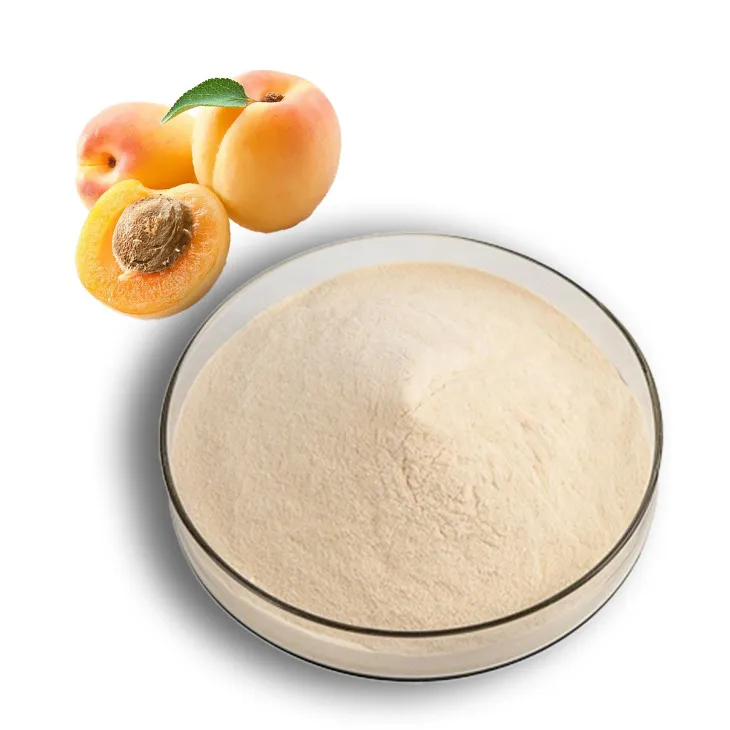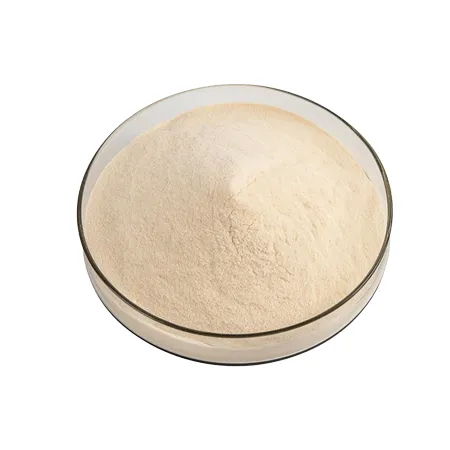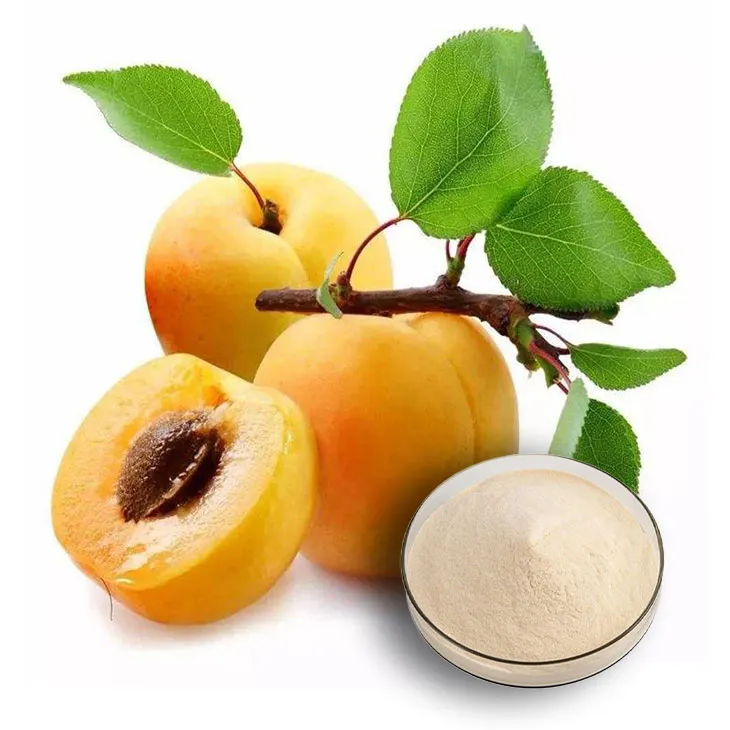- 0086-571-85302990
- sales@greenskybio.com
Apricot powder extraction technology and production process.
2024-11-29

1. Introduction
Apricot Powder has gained significant popularity in various industries, including food, cosmetics, and pharmaceuticals. Its extraction technology and production process are of great importance to ensure high - quality products. This article will explore these aspects in detail, covering everything from the initial pretreatment of apricots to the final quality control measures.

2. Pretreatment of Apricots
2.1 Cleaning
The first step in the pretreatment of apricots is cleaning. Apricots are often exposed to dirt, pesticides, and other contaminants during growth and harvesting. Proper cleaning is essential to remove these unwanted substances. This can be achieved through a series of washing processes, such as using clean water or mild detergent solutions. The water should be of good quality, free from harmful chemicals, and the washing should be thorough to ensure that all dirt and debris are removed from the surface of the apricots.
2.2 Peeling
After cleaning, peeling is another crucial step. The peel of the apricot may contain substances that are not desirable in the final Apricot Powder product. There are different methods for peeling apricots. One common method is mechanical peeling, which involves using specialized equipment to remove the peel. Another option is chemical peeling, although this method requires careful control to ensure that no harmful chemical residues remain on the apricot flesh. Manual peeling can also be used for small - scale production, but it is time - consuming and labor - intensive.
2.3 Kernel Removal
The removal of the apricot kernel is necessary as it has different properties compared to the flesh. Kernels may contain substances such as amygdalin, which can be toxic in large quantities. Accurate kernel removal is crucial to ensure the safety of the Apricot Powder. This can be done manually for small batches or by using mechanical devices in larger - scale production.

3. Extraction Techniques
3.1 Traditional Extraction Methods
Traditional extraction methods for apricot powder have been used for a long time. One such method is solvent extraction. In solvent extraction, a suitable solvent is used to dissolve the active components from the apricot flesh. Common solvents include ethanol, methanol, and water. However, this method has some drawbacks. For example, it may result in the presence of solvent residues in the final product, which can affect the quality and safety of the apricot powder. Additionally, the extraction efficiency may not be as high as some modern techniques.
3.2 Modern Extraction Technologies
Modern technologies have emerged in recent years, offering improved extraction capabilities. One of the most promising is supercritical fluid extraction. Supercritical fluids, such as supercritical carbon dioxide (scCO₂), possess unique properties. They have the diffusivity of a gas and the density of a liquid, which makes them excellent solvents for extracting various components from apricots. The advantages of supercritical fluid extraction include high extraction efficiency, selectivity, and the ability to produce a cleaner product with minimal solvent residues. Another modern technique is microwave - assisted extraction, which uses microwave energy to enhance the extraction process. This method can significantly reduce the extraction time and improve the yield of the active components.

4. Production Process
4.1 Temperature Control
Temperature plays a significant role in the production process of apricot powder. During extraction, different temperatures can affect the solubility of the components in the solvent or supercritical fluid. For example, in supercritical fluid extraction, an appropriate temperature is required to maintain the supercritical state of the fluid. If the temperature is too low, the fluid may not be in the supercritical state, resulting in reduced extraction efficiency. On the other hand, if the temperature is too high, it may cause degradation of the active components in the apricot. In subsequent drying processes, temperature control is also crucial to ensure that the apricot powder is dried properly without losing its nutritional value or functionality.
4.2 Pressure Control
In extraction processes such as supercritical fluid extraction, pressure control is essential. The pressure affects the density and solubility of the supercritical fluid. Maintaining the correct pressure is necessary to ensure efficient extraction. For example, in the case of scCO₂, a specific pressure range needs to be maintained to achieve optimal extraction conditions. Deviations from the appropriate pressure can lead to incomplete extraction or the extraction of unwanted components.
4.3 Time Control
The extraction and production process also requires careful time control. The extraction time should be sufficient to extract the desired components from the apricots, but not too long to avoid over - extraction or degradation. In drying processes, the drying time should be optimized to ensure that the apricot powder reaches the appropriate moisture content without excessive energy consumption or quality degradation. Different factors, such as the type of extraction method, the nature of the apricots, and the desired final product quality, will influence the determination of the optimal extraction and drying times.
5. Quality Control
5.1 Physical and Chemical Analysis
Quality control in apricot powder production involves various physical and chemical analyses. Physical properties such as particle size, color, and texture are important indicators of product quality. Particle size can affect the solubility and dispersibility of the apricot powder in different applications. Chemical analysis includes determining the content of active components, such as vitamins, minerals, and phenolic compounds. It also involves checking for the presence of contaminants, such as heavy metals, pesticides, and solvent residues. Analytical techniques such as high - performance liquid chromatography (HPLC), gas chromatography - mass spectrometry (GC - MS), and atomic absorption spectroscopy (AAS) are often used for these analyses.
5.2 Microbiological Testing
Microbiological testing is another crucial aspect of quality control. Apricot powder should be free from harmful microorganisms such as bacteria, fungi, and yeasts. Microbiological tests are carried out to ensure that the product meets the safety standards. These tests include total plate count, detection of specific pathogens, and determination of the presence of spoilage organisms. If the microbiological quality is not satisfactory, appropriate measures such as sterilization or pasteurization may need to be implemented.
6. Safety Measures
6.1 Worker Safety
During the production process of apricot powder, worker safety is of utmost importance. Workers may be exposed to various hazards, such as chemical solvents in extraction processes, mechanical risks during equipment operation, and potential allergenic substances from apricots. Adequate safety training should be provided to workers to ensure that they are aware of the potential risks and know how to protect themselves. This includes wearing appropriate personal protective equipment (PPE), such as gloves, masks, and safety glasses, and following proper operating procedures.
6.2 Product Safety
Product safety is also a key consideration. The apricot powder should be safe for consumption or use in various applications. This requires strict control of raw materials, ensuring that they are free from contaminants and toxins. In addition, during the production process, measures should be taken to prevent cross - contamination and ensure that the final product meets all relevant safety regulations. This may involve proper storage of raw materials and finished products, as well as regular monitoring and testing of the production environment.
7. Conclusion
The extraction technology and production process of apricot powder are complex and multi - faceted. From the pretreatment of apricots to the final quality control and safety measures, each step is crucial in ensuring the production of high - quality apricot powder. With the continuous development of extraction technologies and the increasing demand for high - quality products, it is essential to stay updated on the latest research and best practices in this field.
FAQ:
1. What are the main steps in the pretreatment of apricots before extraction?
The main steps in the pretreatment of apricots before extraction are cleaning, peeling, and kernel removal. Cleaning helps to remove dirt and impurities from the surface of apricots. Peeling is necessary as the peel may contain substances that are not desired in the final apricot powder. Kernel removal is also important as the kernel has different properties compared to the flesh of the apricot.
2. How does supercritical fluid extraction work in apricot powder extraction?
Supercritical fluid extraction in apricot powder extraction works by using a fluid (usually carbon dioxide) at a supercritical state. In this state, the fluid has properties between those of a liquid and a gas. It can penetrate the apricot material effectively and selectively extract the desired components. The supercritical fluid can dissolve the target compounds from the apricot, and then by changing the pressure and temperature, the extracted components can be separated from the fluid, resulting in the extraction of apricot powder.
3. Why are temperature, pressure, and time control important in the apricot powder production process?
Temperature, pressure, and time control are important in the apricot powder production process because they directly affect the chemical reactions and physical changes that occur. Different temperatures can influence the activity of enzymes present in the apricots, which may affect the quality and composition of the final product. Pressure can impact the extraction efficiency, especially in methods like supercritical fluid extraction. The time of each step also matters, as too short a time may lead to incomplete extraction or processing, while too long a time may cause degradation of the apricot components.
4. What are the key aspects of quality control in apricot powder production?
The key aspects of quality control in apricot powder production include monitoring the raw materials for quality and freshness, ensuring proper extraction and processing conditions (such as accurate temperature, pressure, and time control), testing for the presence of contaminants (such as pesticides or heavy metals), and evaluating the final product for its nutritional content, flavor, and texture. Quality control also involves standardizing the production process to ensure consistency in the quality of the apricot powder produced.
5. What safety measures should be considered during apricot powder production?
During apricot powder production, safety measures such as ensuring proper handling of equipment to prevent accidents, following strict hygiene standards to avoid microbial contamination, and using appropriate protective gear for workers are important. Also, when using extraction techniques like supercritical fluid extraction, safety in handling the supercritical fluid (e.g., proper storage and pressure control) is crucial. Additionally, safety in the storage and packaging of the final apricot powder product should be considered to prevent spoilage and ensure consumer safety.
Related literature
- Advances in Apricot Processing Technologies"
- "Apricot Powder: Production, Quality, and Applications"
- "Supercritical Fluid Extraction in Fruit Processing: A Case of Apricot"
- ▶ Hesperidin
- ▶ Citrus Bioflavonoids
- ▶ Plant Extract
- ▶ lycopene
- ▶ Diosmin
- ▶ Grape seed extract
- ▶ Sea buckthorn Juice Powder
- ▶ Fruit Juice Powder
- ▶ Hops Extract
- ▶ Artichoke Extract
- ▶ Mushroom extract
- ▶ Astaxanthin
- ▶ Green Tea Extract
- ▶ Curcumin
- ▶ Horse Chestnut Extract
- ▶ Other Product
- ▶ Boswellia Serrata Extract
- ▶ Resveratrol
- ▶ Marigold Extract
- ▶ Grape Leaf Extract
- ▶ New Product
- ▶ Aminolevulinic acid
- ▶ Cranberry Extract
- ▶ Red Yeast Rice
- ▶ Red Wine Extract
-
Kupilu Extract
2024-11-29
-
Bitter Melon Extract
2024-11-29
-
Pomegranate Extract
2024-11-29
-
Pine bark Extract Powder
2024-11-29
-
Bamboo Leaf extract
2024-11-29
-
Sophora Flavescens Root Extract
2024-11-29
-
Artichoke Extract
2024-11-29
-
White Peony Extract
2024-11-29
-
Yellow Pine Extract
2024-11-29
-
Peppermint Extract Powder
2024-11-29





















